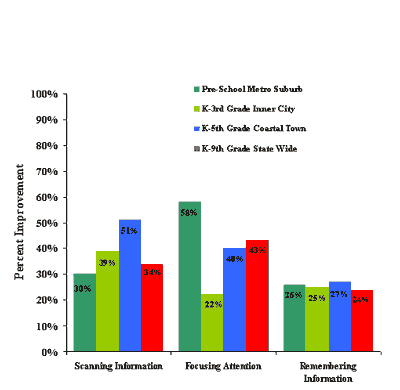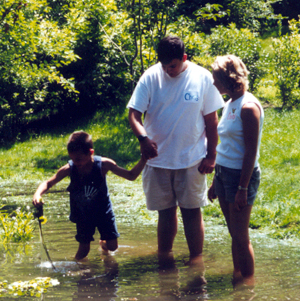A recent study of ICAD's Community Outreach programs reported that
after receiving weekly treatment by the ICAD team for a year, the children
showed improvements ranging from 22% to 58% in several cognitive areas
monitored by ICAD: for example, the way a child examines information,
focuses attention and remembers what she/he had learned (represented
in the following graph). This growth was also associated with an average
gain of 21% in a child's mental age: that is what a child is expected
to do intellectually for her/his age

When ICAD compared the test results of a group that had received weekly
treatment with a group who had not, it was found that the children who
received treatment showed cognitive and emotional gains that were 4
times greater than the gains made by the children who did not receive
any treatment.
Goals
The goals of the ICAD program are: a) to continue to provide free screenings,
intervention and educational programs, which will enable children and
their families who reside in the communities ICAD serves to optimize
and actualize their educational and social resources and to develop
skills to cope effectively with the effects of traumatic events and;
b) to train parents, child care providers, teachers and school counselors
in utilizing specialized individual and group activities designed to
help children overcome emotionally traumatic happenings, and most importantly
"learn how to learn" efficiently; and c) to honor community
sites requests for ICAD to increase its involvement by increasing the
number of days ICAD staff is on-site. To meet these requests and to
deepen the existing partnerships, additional trained child-care professionals
should be added. Additional staffing, as funding permits, would strengthen
these programs.
ICAD's IN-HOUSE PROGRAMS
Therapeutic Garden
The Therapeutic Garden has introduced a groundbreaking approach to the
psychological treatment of children. Rather than confining children
to a treatment room, the therapeutic garden provides them and their
therapists with the opportunity to interact with landscape during treatment
sessions in order to resolve the effects of trauma. By including nonverbal
communication, and enactments, while interacting with landscape, ICAD's
innovative treatment methods integrate a child's body image, and what
a child does, with what a child imagines and says, thereby repairing
the effects of trauma at all developmental levels. The Therapeutic Garden
also serves as an educational tool for health professionals. This original
garden was awarded the "Presidents Award of Excellence" by
the American Society of Landscape Architecture.
Training
ICAD continues to provide training programs in sophisticated treatment
methods to pre and postdoctoral students as well as to other health
care professionals and volunteers. Our current students come from as
far away as Bosnia. Current students come to us from: Boston College,
Harvard University, Massachusetts School of Professional Psychology,
The College of the Holy Cross, Tufts University, University of Michigan,
University of Texas, and the United States Navy. To date, ICAD has trained
69 predoctoral and postdoctoral students, as well as volunteers in diagnostic
and counseling techniques designed especially for children who have
experienced traumatic events.
Research
Overlaying ICAD's work is the rigorous research conducted by the Institute's
staff. ICAD's research projects investigate how specific life stressors
and traumatic events affect a child's behavior and cognitive and emotional
development. In addition, ICAD has developed and continues to study
diagnostic tests that measure changes in a variety of behavioral and
cognitive skills that serve how a child learns, copes and develops.
These tests are invaluable for tracking each child's progress, as well
as assessing the effectiveness of ICAD's interventions.
Research results are published through articles and books, expanding
the awareness of this critical area of need and sharing methods and
results with other professionals. It is with pleasure that we report
we now have an international audience. The ICAD research team was published
in the Spanish Journal of Psychology in the spring of 2001. (Contact
ICAD for a complete list of publications).
Current Sites


